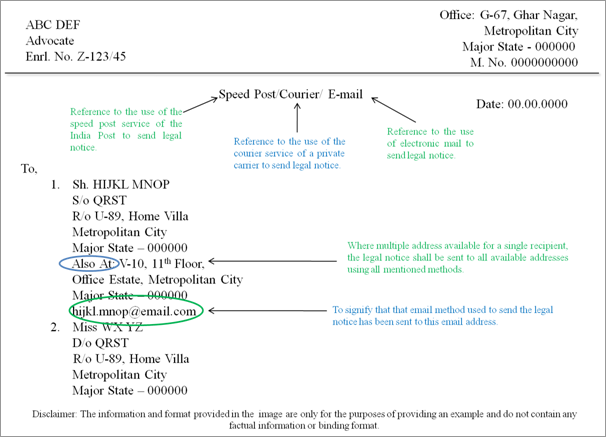Legal notice is the first of many documents required in order to initiate legal proceedings. Legal notices in certain cases are a statutory requirement, a formality in others, and always a last attempt at resolution of the issue without approaching the court of law. The entire idea behind sending a legal notice is to make the recipient aware of the harm/damage caused by them and the associated grievance of the sender. It is thus important to ensure that there is assured timely delivery of the legal notice to the intended recipient. This ensures that there have been attempts at notifying the recipient of the harm/damage caused and attempt at resolving the issue. If not, ensuring delivery of the legal notice will contribute towards the document trail required for legal process before the court of law.
Ensuring Delivery
There are various ways through which the sender of the legal notice can ensure that there is assured delivery of the legal notice to the intended recipient(s). This is through the use of more than one mode of sending the legal notice. The modes used for sending a legal notice are usually mentioned at the top of the legal notice itself. This indicates that all of the mentioned modes of sending the legal notice have been used by the sender to send each of the intended recipients the legal notice.

Proof of Assured Delivery
Sending a legal notice by way of email where the sender has not received a “failure to deliver” email in response, is considered assured delivery. In case of sending the notice by post or courier, the receipt that the carrier gives along with its delivery report is a valid proof of such delivery or attempt made to ensure delivery. With legal notices sent by post and courier, where the delivery report comes as anything but “delivered”, the sender has the duty to explain to the court the reason the sender believed the address to be the place where the intended recipient will be usually available.
Relevance
Ensuring delivery of the legal notice, or to make best efforts to attempt delivery of legal notice is important for when the issue ends up before the court of law. Not all legal notices lead to resolution of differences at the initial stages before the issue ends up in court. Hence, it is important that all necessary document trails are prepared for if and when the issue is brought before the court of law.
Conclusion
Legal notice contributes towards formation of the base of a process of dispute resolution. Not all issues leading to legal notices end up before the court of law, but those that do put the legal notice and the entire process through strict scrutiny. The evaluation of the legal notice and its process is especially strict in instances where the legal notice is a statutory requirement and/or a strict timeline has been laid down by the law for a legal notice.